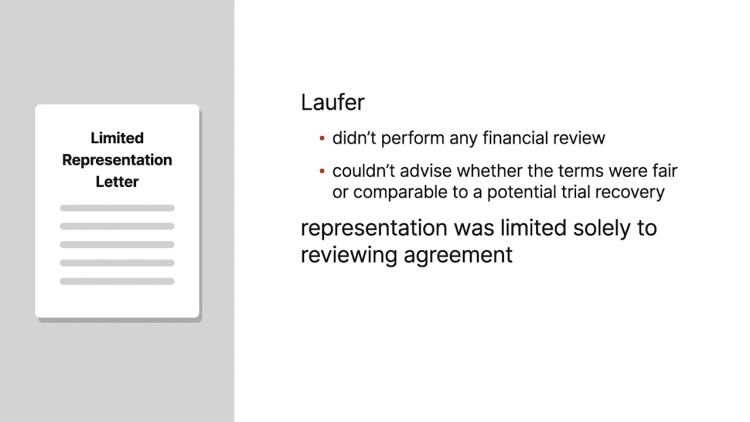Lerner v. Laufer
New Jersey Superior Court, Appellate Division
359 N.J. Super. 201, 819 A.2d 471 (2003)
- Written by Rose VanHofwegen, JD
Facts
When Michael H. Lerner divorced Lynne C. Lerner (plaintiff), he contacted his business lawyer and family friend to mediate a property-settlement agreement (the agreement) to divide the couple’s considerable fortune. Several sessions resulted in a draft agreement proposing that Lynne accept $500,000 and 15 percent of stock acquired during marriage (worth over $3 million), alimony, and child support, in exchange for waiving rights to the remaining 85 percent of stock. The mediator gave Lynne a list of attorneys (forwarded from Michael’s divorce attorney) to consult before signing the agreement. Lynne called William Laufer (defendant), an experienced divorce attorney, who had already received the draft. Five days later, Laufer met with Lynne and provided a letter detailing that Laufer had not performed any financial review and could not advise whether the terms were fair or comparable to a potential trial recovery. Instead, the letter explicitly limited representation solely to reviewing the agreement itself and stated that Lynne accepted those limits and agreed not to sue Laufer. Lynne read and signed the letter, reviewed the agreement with Laufer, discussed the value of the couple’s stock, and executed the agreement. Lynne later signed and returned Laufer’s standard retainer agreement stating that services would include financial due diligence and advice as to potential trial recovery. Laufer suggested some amendments before the divorce hearing, when an amended final agreement was incorporated into a divorce judgment. Lynne sued for malpractice five years later, claiming Laufer failed to perform duties typically expected of a divorce attorney and that Laufer’s letter neither limited nor waived Lynne’s right to full representation. Lynne also claimed that by suggesting amendments to the agreement, Laufer exceeded the limitation and was thus fully liable. The trial court dismissed the malpractice action. Lynne appealed.
Rule of Law
Issue
Holding and Reasoning (Wells, J.)
What to do next…
Here's why 907,000 law students have relied on our case briefs:
- Written by law professors and practitioners, not other law students. 47,100 briefs, keyed to 996 casebooks. Top-notch customer support.
- The right amount of information, includes the facts, issues, rule of law, holding and reasoning, and any concurrences and dissents.
- Access in your classes, works on your mobile and tablet. Massive library of related video lessons and high quality multiple-choice questions.
- Easy to use, uniform format for every case brief. Written in plain English, not in legalese. Our briefs summarize and simplify; they don’t just repeat the court’s language.





